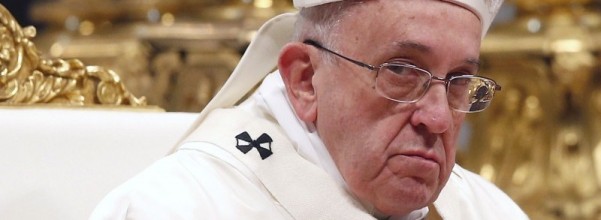 The Cardinal Prefect of the Congregation for the Doctrine of the Faith has been interviewed in the Italian magazine, Il Timone. The Cardinal Prefect, whilst not directly, essentially upholds Catholic doctrine and answers the dubia.
The Cardinal Prefect of the Congregation for the Doctrine of the Faith has been interviewed in the Italian magazine, Il Timone. The Cardinal Prefect, whilst not directly, essentially upholds Catholic doctrine and answers the dubia.
Yet, the recent dubia issued by the Cardinals cannot be answered in a magazine but must be answered officially and formally by the Congregation or by the Pope himself. Until that time comes, there can be no letting up on the pressure to ensure that Pope Bergoglio "confirms his brothers in the faith."
The Bishops of Malta, the Vicar of Rome, the Bishops of Buenos Aires, and various dioceses in the United States and elsewhere are pointedly criticised by Müller. Yet, if those bishops think that they are doing the Pope's bidding, then it is the document that is defective, and the Pope who is wrong.
What must happen to these bishops, if Müller is faithful to Christ and his role as guardian of doctrine, is a formal correction to these bishops by him and in the Pope's name. Given the confusion and diabolical disorientation, the correction must really come from the Pope himself.
But will the ever-humble Bergoglio yield? Will he repent of his error and correct himself and the wayward bishops? Or will he remove Cardinal Müller, along soon perhaps with Cardinal Burke, and further entrench what has become a dictatorship, a Peronist lead scandal upon the Holy Church of Christ.
Time will tell; but rest assured, Christ will not be mocked by anyone, let alone his Vicar!
http://magister.blogautore.espresso.repubblica.it/2017/02/01/the-pope-is-silent-but-cardinal-muller-speaks-who-responds-to-the-%E2%80%9Cdubia%E2%80%9D-this-way/
Q - Can there be a contradiction between doctrine and personal conscience?
A: (Cardinal Müller) No, that is impossible. For example, it cannot be said that there are circumstances according to which an act of adultery does not constitute a mortal sin. For Catholic doctrine, it is impossible for mortal sin to coexist with sanctifying grace. In order to overcome this absurd contradiction, Christ has instituted for the faithful the Sacrament of penance and reconciliation with God and with the Church.
Q: This is a question that is being extensively discussed with regard to the debate surrounding the post-synodal exhortation “Amoris Laetitia.”
A: “Amoris Laetitia” must clearly be interpreted in the light of the whole doctrine of the Church. [...] I don’t like it, it is not right that so many bishops are interpreting “Amoris Laetitia” according to their way of understanding the pope’s teaching. This does not keep to the line of Catholic doctrine. The magisterium of the pope is interpreted only by him or through the congregation for the doctrine of the faith. The pope interprets the bishops, it is not the bishops who interpret the pope, this would constitute an inversion of the structure of the Catholic Church. To all these who are talking too much, I urge them to study first the doctrine [of the councils] on the papacy and the episcopate. The bishop, as teacher of the Word, must himself be the first to be well-formed so as not to fall into the risk of the blind leading the blind. [...]
Q: The exhortation of Saint John Paul II, “Familiaris Consortio,” stipulates that divorced and remarried couples that cannot separate, in order to receive the sacraments must strive to live in continence. Is this requirement still valid?
A: Of course, it is not dispensable, because it is not only a positive law of John Paul II, but he expressed an essential element of Christian moral theology and the theology of the sacraments. The confusion on this point also concerns the failure to accept the encyclical “Veritatis Splendor,” with the clear doctrine of the “intrinsece malum.” [...] For us marriage is the expression of participation in the unity between Christ the bridegroom and the Church his bride. This is not, as some said during the Synod, a simple vague analogy. No! This is the substance of the sacrament, and no power in heaven or on earth, neither an angel, nor the pope, nor a council, nor a law of the bishops, has the faculty to change it.
Q: How can one resolve the chaos that is being generated on account of the different interpretations that are given of this passage of Amoris Laetitia?
A: I urge everyone to reflect, studying the doctrine of the Church first, starting from the Word of God in Sacred Scripture, which is very clear on marriage. I would also advise not entering into any casuistry that can easily generate misunderstandings, above all that according to which if love dies, then the marriage bond is dead. These are sophistries: the Word of God is very clear and the Church does not accept the secularization of marriage. The task of priests and bishops is not that of creating confusion, but of bringing clarity. One cannot refer only to little passages present in “Amoris Laetitia,” but it has to be read as a whole, with the purpose of making the Gospel of marriage and the family more attractive for persons. It is not “Amoris Laetitia” that has provoked a confused interpretation, but some confused interpretations of it. (I disagree, Amoris Laetitia is full of confusion and intentionally so and Berogoglio's comments at both and after the Synods affirms it. I suspect he is being political here so as not to contradict the Pope directly. - Vox) All of us must understand and accept the doctrine of Christ and of his Church, and at the same time be ready to help others to understand it and put it into practice even in difficult situations.














